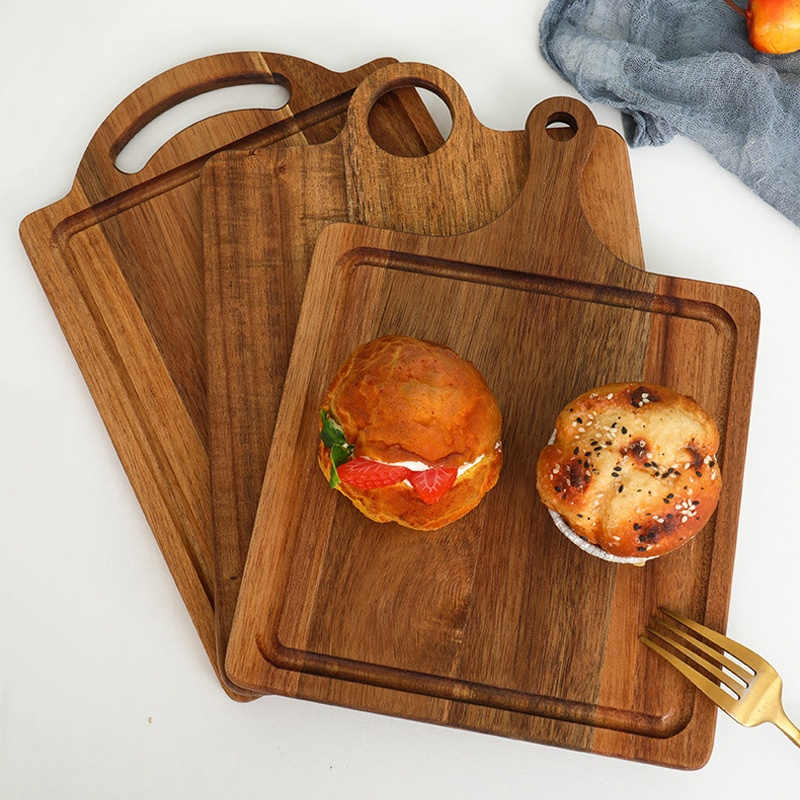In the realm of culinary artistry, a wooden food cutting boards stands as an indispensable tool, a canvas upon which countless culinary masterpieces are brought to life. Its warm, organic presence adds a touch of rustic charm to any kitchen, while its functional versatility makes it a cornerstone of any home cook’s arsenal.
Types of Wooden Food Cutting Boards
The choice of wood for a cutting board is paramount, as it directly influences its durability, longevity, and hygiene. Each type of wood possesses unique characteristics that cater to specific preferences and needs:
- Maple: A dense, hard wood known for its resistance to scratches and dents, making it ideal for heavy-duty cutting tasks.
- Teak: A tropical hardwood renowned for its water-resistant properties and natural antimicrobial qualities, making it a hygienic choice for food preparation.
- Walnut: A dark, rich wood with a medium hardness, offering a balance of durability and ease of maintenance.
- Ash: A lightweight, flexible wood with good shock absorption, suitable for delicate cutting tasks and carving.
- Bamboo: A sustainable alternative to traditional hardwoods, bamboo is strong, durable, and environmentally friendly.
Choosing the Right Size and Shape
The size and shape of a cutting board should be tailored to your specific needs and kitchen space. Consider the following factors:
- Size: Choose a board that is large enough to accommodate your typical cutting tasks without being overly cumbersome.
- Shape: Rectangular boards are versatile and suitable for most cutting needs, while round boards are ideal for carving or slicing smaller items.
- Thickness: Thicker boards provide greater stability and durability, while thinner boards are easier to store and handle.
Care and Maintenance
Proper care and maintenance are essential to prolong the life of your wooden cutting board . Follow these guidelines:
- Clean regularly: Wash the board thoroughly with warm, soapy water after each use. Avoid using harsh chemicals or abrasive sponges.
- Sanitize occasionally: To eliminate bacteria, soak the board in a solution of 1 tablespoon bleach per gallon of water for 5 minutes.
- Oil regularly: Apply food-grade mineral oil or beeswax to the board every few months to prevent drying and cracking.
- Store properly: Keep the board in a dry, well-ventilated area when not in use. Avoid storing it in direct sunlight or near heat sources.
Benefits of Using a Wooden Cutting Board
Wooden cutting boards offer a myriad of benefits over other materials:
- Natural: Wood is a natural material that does not leach harmful chemicals into food.
- Durable: With proper care, wooden boards can last for many years, making them a cost-effective investment.
- Hygienic: When properly maintained, wooden boards are resistant to bacteria and mold growth.
- Versatile: Wooden boards can be used for a wide range of cutting tasks, from chopping vegetables to slicing meat.
- Aesthetically pleasing: The natural beauty of wood adds a touch of warmth and elegance to any kitchen.
Conclusion
A wooden food cutting board is an essential tool for any home cook. By choosing the right type of wood, size, and shape, and following proper care and maintenance guidelines, you can enjoy a durable, hygienic, and aesthetically pleasing cutting surface for years to come. Embrace the warmth and versatility of wood, and elevate your culinary creations with a cutting board that is as functional as it is beautiful.

Landy is established in 2007. we engaged in the research development and sale of wooden products. Our main products: wooden box, wooden tray, wooden decoration,wooden shelf, wooden pet products ,wood photo frame and so on. Different machines are equipped with in our factory to meet different orders’ requirements.
Get a quote or OEM service, Please contact us: WhatsApp And Phone: +8615166867527 or Email: crystal@ytlandy.com
